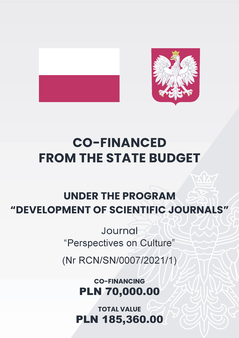Vasa’s Diplomat towards the Court of Spanish Queens – Commonwealth and the West, Divergent Strategies of Engagement?
Abstract
Comparative analyses of political cultures between the western kingdoms and Polish-Lithuania Commonwealth have revealed profound disparities. These distinctions are exemplified by the diplomatic endeavors of Stanisław Mąkowski, a longstanding diplomat of the Polish Vasa dynasty, who served as the envoy at the Spanish courts in Madrid and Naples from 1627 to 1655. Primarily tasked with securing Neapolitan subsidies, Mąkowski’s comprehension of Spanish court dynamics and his chosen strategies of engagement come into question. The treatment of influential court women serves as an indicative measure in this regard. Navigating between the complexities of Spanish courtly life and his loyalty to the Commonwealth monarchy posed formidable challenges for the diplomat, necessitating a delicate balance between adaptation and advocacy for his sovereign’s interests.
References
Calliere, E. (1888). Klasztor OO. Benedyktynów w Lubiniu Wielkopolskim. Szkic geograficzno-historyczny. W: Szkice geograficzno-historyczne. Seria druga. Poznań, 18–39.
Conde Pazzos, M. (2011). El tratado de Nápoles. El encierro del Príncipe Juan Casimiro y la leva de los polacos de Medina de las Torres (1638–1642). Studia Historica. Historia Moderna, nr 33, 123–139.
Conde Pazos, M. (2014). Entre franceses y españoles: El cardenalato del príncipe Juan Casimiro Vasa y la diplomacia hispana en Italia (1643–1648). VII Seminario Internacional „La Corte en Europa“, nr 1, 33–51.
Fernández, M.C. (2015). Un ejemplo de transculturalidad y diplomacia en la época moderna la embajadora Lady Fanshaw en la corte madrileña (1664–1666). W: J.J.I. Rodríguez, R.M. Pérez García, M.F. Fernández Chaves (coord.), Comercio y cultura en la Edad Moderna: Actas de la XIII Reunión Científica de la Fundación Española de Historia Moderna, 2867–2877.
Gemma, A. (2019). The Rise of the Ambassadress: English Ambassadorial Wives and Early Modern Diplomatic Culture. The Historical Journal, 62(3), 617–638.
Grabowski, A. (wyd.) (1845). Listy i inne pisma urzędowe Władysława IV: materyał dziejowy. Kraków.
Heredia Moreno, M.C. i Hidalgo Ogáyar, J. (2016). Intercambio de rega-los entre la realeza europea y mercedes reales por servicios presta-dos a la corona (1621–1640). De Arte, nr 15, 150–167.
Herrero Sánchez, M. (1999). La política de embargos y el contrabando de productos de lujo en Madrid (1635–1673). Sociedad cortesana y dependencia de los mercados internacionales. Hispania, nr LIX/1 (201), 171–191.
Kalinowska, J.A. (wyd.). (1992). Z dworu Stanisława Hozjusza: listy Stani-sława Reszki do Marcina Kromera, 1568–1582. Olsztyn: Ośrodek Ba-dań Nauk im. W. Kętrzyńskiego i Towarzystwa Nauk im. W. Kętrzyńskiego.
Kieniewicz, J. i Urjasz-Raczko, M. (2020). Fathoming Spanish Arcana: Philip IV and His Court in the Eyes of the Polish Ambassador Stanisław Mąkowski (1638–1647). W: J.L. Colomer, J. Fernández-Santos i J. El-liott (eds.), Ambassadors in Golden-Age Madrid. The court of Philip IV ‘The Planet King’ through Foreign Eyes. Madrid: CEEH, 173–199.
Kozłowski, P.K. (2012). Rola duchowieństwa na dworze Władysława IV Wazy. Kronika Zamkowa: biuletyn informacyjny Zamku Królewskiego w Warszawie, nr 1–2, 47–78.
Krzyżagórska-Pisarek, K. (2012). Two Portraits of the Prince Ladis-las-Sigismund Vasa from the Collections in Wawel Castle re-examined. Rocznik Historii Sztuki, nr XXXVII, 93–114.
Llorente, M. (2018). La reina doña Mariana y el embajador Holandés Hi-eronymus van Berveningk. Magallánica. Revista de Historia Moderna, nr 5/9, 217–238.
Michalewicz, J. (1974). Mąkowski Stanisław. W: Polski słownik biogra-ficzny, t. XIX.
Nieto Nuño, M. (ed.). (1990 i 1993). Diario del conde de Pötting, embaja-dor del Sacro Imperio en Madrid. Madrid: Escuela Diplomática, 2 vols.
Ochoa Brun, M.A. (2005). Los Embajadores de Felipe IV. W: J. Al-calá-Zamora y Queipo de Llano (coord.), Felipe IV: el hombre y el reinado. Madrid: Real Academia de la Historia; Centro de Estudios Europa Hispánica, CEEH, 199–234.
Ochoa Brun, M.A. (2006). Historia de la Diplomacia Española. La Edad Barroca, II. Madrid: Ministerio de Asuntos Exteriores, 195, 342–344.
Oliván Sataliestra, L. (2012). Aromas para ver, tocar y degustar. Usos y elaboración del perfume cortesano en el siglo XVII. W: G. Franco (coord.), La vida de cada día: rituales, costumbres y rutinas cotidianas en la España Moderna. Madrid: Al-Mudayna, 299–327.
Oliván Santaliestra, L. (2015). Lady Anne Fanshawe, Ambassadress of England at the Court of Madrid (1664–1666). W: G. Sluga i C. James (red.), Women, Diplomacy and International Politics since 1500. Lon-don: Routledge, 65–86.
Oliván Santaliestra, L. (2016). Amazonas del secreto en la embajada madrileña del Graf von Pötting (1663–1674). Memoria y civilización: anuario de historia, nr 19, 221–254.
Oliván Santaliestra, L. (2016). Judith Rebecca von Wrbna and Maria So-phia von Dietrichstein: Two Imperial Ambassadresses from the King-dom of Bohemia at the Court of Madrid (1653–1674). Theatrum histo-riae, nr 19, 95–117.
Sánchez Martín, J.L. i Sancho de Monroy y de Zúñiga. W: Real Academia de la Historia, Diccionario Biográfico electrónico. Pozyskano z: http://dbe.rah.es/biografias/21215/sancho-de-monroy-y-de-zuniga (dostęp: 02.05.2021)
Skowron, R. (1996). Dyplomaci polscy w Hiszpanii w XVI i XVII wieku. Kra-ków: Universitas, 146–196.
Skowron, R. (2013). Pax i Mars. Polsko-hiszpańskie relacje polityczne w latach 1632–1648. Kraków: Uniwersytet Śląski w Katowicach. To-warzystwo Wydawnicze „Historia Iagiellonica”, 289–313.
Urjasz-Raczko, M. (2019). Comprender lo incomprensible. Los diplomáti-cos de Felipe II de Habsburgo frente a las primeras elecciones libres en la República polaco-lituana (1573–1587). Investigaciones históricas: Época moderna y contemporánea, nr 39, 149–178.
Urjasz-Raczko, M. (2022). Dwory kobiece w historiografii hiszpańskiej. Przegląd badań. Perspektywy Kultury, 4(39), 49–59.
Urjasz-Raczko, M. i Conde Pazos, M. (2020). La política exterior de los Jagellones en el siglo XVI. W: J. Kieniewicz, A. Alvar Ezquerra, C. Gon-zález-Caizán, M. Urjasz-Raczko i M. Conde Pazos (red.), Cartas latinas en la época de los Jagellones. Años 1519–1572. Madrid: Ministerio de Asuntos Exteriores Unión Europea y Cooperación, Instituto Polaco de Cultura de Madrid, Facultad de “Artes Liberales” de la Universidad de Varsovia, 19–45.
Vermeir, R., Andrés de Rozas. W: Real Academia de la Historia, Dic-cionario Biográfico electrónico. Pozyskano z: http://dbe.rah.es/biografias/37975/andres-de-rozas (dostęp 02.05.2021)
Vermeir, R. Charles de Bonnières. W: Real Academia de la Historia, Dic-cionario Biográfico electrónico. Pozyskano z: http://dbe.rah.es/biografias/58051/charles-de-bonnieres (dostęp: 02.05.2021)
Żukowski, J. (2010). Admirał hiszpańskiej floty na Bałtyku. Zapomniany portret Władysława Zygmunta Wazy według Petera Claesz Soutma-na. Barok: historia, literatura, sztuka, nr 1, 105–122.
Copyright (c) 2024 Ignatianum University in Cracow

This work is licensed under a Creative Commons Attribution 4.0 International License.
Autor, zgłaszając swój artykuł, wyraża zgodę na korzystanie przez Wydawnictwo Uniwersystet Ignatianum z utworu na następujących polach eksploatacji:
- utrwalania utworu w formie papierowej, a także na nośniku cyfrowym lub magnetycznym;
- zwielokrotnienia utworu dowolną techniką, bez ograniczenia ilości wydań i liczby egzemplarzy;
- rozpowszechniania utworu i jego zwielokrotnionych egzemplarzy na jakimkolwiek nośniku, w tym wprowadzenia do obrotu, sprzedaży, użyczenia, najmu;
- wprowadzenia utworu do pamięci komputera;
- rozpowszechniania utworu w sieciach informatycznych, w tym w sieci Internet;
- publicznego wykonania, wystawienia, wyświetlenia, odtworzenia oraz nadawania i reemitowania, a także publicznego udostępniania utworu w taki sposób, aby każdy mógł mieć do niego dostęp w miejscu i czasie przez siebie wybranym.
Wydawca zobowiązuje się szanować osobiste prawa autorskie do utworu.






